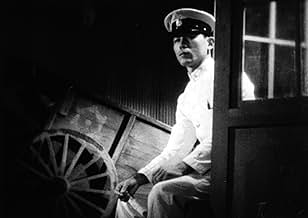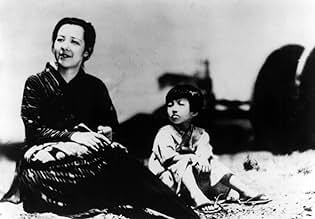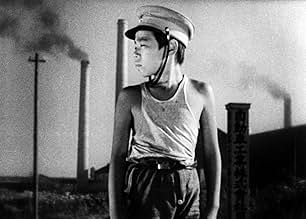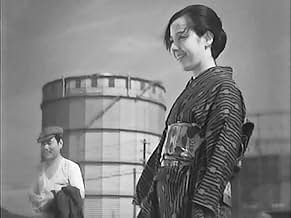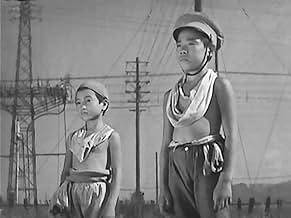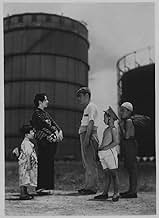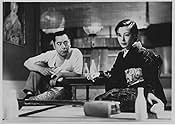VALUTAZIONE IMDb
7,4/10
1770
LA TUA VALUTAZIONE
Aggiungi una trama nella tua linguaUnemployed Kihachi and his two sons struggle to make ends meet. But that doesn't keep Kihachi from wooing single mother Otaka.Unemployed Kihachi and his two sons struggle to make ends meet. But that doesn't keep Kihachi from wooing single mother Otaka.Unemployed Kihachi and his two sons struggle to make ends meet. But that doesn't keep Kihachi from wooing single mother Otaka.
- Regia
- Sceneggiatura
- Star
Recensioni in evidenza
This film deals with an unemployed man and his two sons who rover through the industrial areas of Tokyo during the depression in the search for work.
After some bad luck the father is able to find a job but then the pity for a single mother and her sick little daughter makes him do something he should not have done.
This is the very simple story but this is not what makes the film a masterpiece. The great achievement is that Ozu shows how poverty affects the human mind. He depicts the fear and the feeling of senselessness in a way that nobody else has ever done. Many of the devices him employs are very imaginative. Many people might compare this film to de Sica's "Ladri di biciclette" which was made 12 years later. But without doing a disservice to de Sica's masterpiece: "Tokyo no yado" is the best film that was ever made about poverty and unemployment,
After some bad luck the father is able to find a job but then the pity for a single mother and her sick little daughter makes him do something he should not have done.
This is the very simple story but this is not what makes the film a masterpiece. The great achievement is that Ozu shows how poverty affects the human mind. He depicts the fear and the feeling of senselessness in a way that nobody else has ever done. Many of the devices him employs are very imaginative. Many people might compare this film to de Sica's "Ladri di biciclette" which was made 12 years later. But without doing a disservice to de Sica's masterpiece: "Tokyo no yado" is the best film that was ever made about poverty and unemployment,
*** I SUMMERIZE THE GENERAL PLOT OF THE FILM AT LENGTH. NARRATIVE SPOILERS AHEAD ***
A man and two boys are seen walking along one of the many lonesome, dusty roads that exist inside the world of Ozu. They are shot from a low angle and against the monumental sky. They are like lone sailors lost at sea.
There is no work for the father (Kihachi), despite the numerous, booming factories, and so there is no food for the young, scrawny boys (Zenko and Masako). They are doomed from the start; trapped in a gray malaise and where luxury exists just out of reach.
Beautiful things happen in the in-between moments of Ozu's films. In his silent films, they usually happen in a field. There is an early scene in this film, where the boys and their father pantomime a rich feast full of fluffy, white rice and endless sake. This short reprieve from hopelessness is heaven for them, and we see them smile for the first time in the film's opening twenty minutes.
But the scene is much more beautiful still, because of the sorrowful, scoring of strings that accompany the images. Ozu may let his characters forget, for a while, their troubles, but he certainly doesn't intend for us to. This dichotomy between what we feel and what the characters feel creates an arresting sense of poignancy. Their temporary enjoyment is not meant for us.
The trio eventually catches a break, one presented to them by an old friend of Kihachi. She is a woman named Otsune with whom he used to kick up trouble. She is now reformed. She is running a restaurant and is able to dig up some work for Kihachi. The next ten days, he says, are the happiest of his life.
Things are complicated by Otaka, an impoverished single mother whose child has grown ill with dysentery. The two, fragmented families have met along their shared but separate paths of economic struggle. Kihachi has grown fond of the mother and the boys enjoy the company of her cherubic daughter. In an effort to repair his broken family, and because he has fallen in love, Kihuchi steals a large sum of money from a local officer to pay for the child's treatment, before turning himself in.
An Inn in Tokyo plays as a series of isolated moments in a bitter life full of cruel ironies. Even so, Ozu imbues a strong poetic beauty (in terms of how he frames this misery) within his social realism that allows the film to effectively absorb the viewer. The film succeeds in not simply drowning in its sea of anguish, but instead by providing a lens through which to see the unexpected moments of joy that go along with it.
A man and two boys are seen walking along one of the many lonesome, dusty roads that exist inside the world of Ozu. They are shot from a low angle and against the monumental sky. They are like lone sailors lost at sea.
There is no work for the father (Kihachi), despite the numerous, booming factories, and so there is no food for the young, scrawny boys (Zenko and Masako). They are doomed from the start; trapped in a gray malaise and where luxury exists just out of reach.
Beautiful things happen in the in-between moments of Ozu's films. In his silent films, they usually happen in a field. There is an early scene in this film, where the boys and their father pantomime a rich feast full of fluffy, white rice and endless sake. This short reprieve from hopelessness is heaven for them, and we see them smile for the first time in the film's opening twenty minutes.
But the scene is much more beautiful still, because of the sorrowful, scoring of strings that accompany the images. Ozu may let his characters forget, for a while, their troubles, but he certainly doesn't intend for us to. This dichotomy between what we feel and what the characters feel creates an arresting sense of poignancy. Their temporary enjoyment is not meant for us.
The trio eventually catches a break, one presented to them by an old friend of Kihachi. She is a woman named Otsune with whom he used to kick up trouble. She is now reformed. She is running a restaurant and is able to dig up some work for Kihachi. The next ten days, he says, are the happiest of his life.
Things are complicated by Otaka, an impoverished single mother whose child has grown ill with dysentery. The two, fragmented families have met along their shared but separate paths of economic struggle. Kihachi has grown fond of the mother and the boys enjoy the company of her cherubic daughter. In an effort to repair his broken family, and because he has fallen in love, Kihuchi steals a large sum of money from a local officer to pay for the child's treatment, before turning himself in.
An Inn in Tokyo plays as a series of isolated moments in a bitter life full of cruel ironies. Even so, Ozu imbues a strong poetic beauty (in terms of how he frames this misery) within his social realism that allows the film to effectively absorb the viewer. The film succeeds in not simply drowning in its sea of anguish, but instead by providing a lens through which to see the unexpected moments of joy that go along with it.
10mgmax
The richly moving story of a hard-luck father and his two children, this masterpiece of unadorned realism may remind you more of Italian films like Shoeshine than Ozu's more staid work of the 50s. (The inspiration was probably Vidor's The Crowd, and a comparison with that masterpiece is by no means out of order.)
10kerpan
I would argue that "Tokyo no yado" (Inn at Tokyo) is not only one of Ozu's best films, but one of the best films by anyone ever. It tells the story of an unemployed and homeless single father (Takeshi Sakamoto) with two sons (the elder of the two being the wonderful Tomio Aoki) looking for work in depression-era Tokyo, whose lives intersects with those of a single mother (the marvelous Yoshiko Okada) of a little daughter likewise forlornly seeking a way (and a place) to live. The children can find moments of happiness in the undustrial wasteland -- and their parents can briefly recollect their own happiness as children. The boys have a brief idyll, after their father gets a job with the help of an old friend (Choko Iida), even getting to go to school (a pleasure they value almost as much as having a fixed home and a dependable supply of food). Things, however, become troubled again when the family loses track of the mother and girl (who have not found any "angel" to help them out). A film that is strikingly beautiful -- and more than a little heart-breaking. It is marred by a tiny section that seems overly melodramatic right before the end (but this might be due to infelicities of the intertitles -- or at least of their translation).
This is a silent film by Ozu, and it is brilliant both in its simple telling of the story and its development of the characters. This film is about a father, Kihachi, who has two small sons and is looking for work, so they can eat. He meets a young mother with a daughter and for a while she is out of the film. Near the end of his rope, he runs into an old female friend, who finds work for him and enables the boys to go to school. The young mother has come to the town with her daughter and he looks to help her, but is also interested in her. As simple as this sounds, the film is wrought with emotion, and is brilliant in that your own thoughts could be somewhat mixed about this. Shouldn't he be more grateful to the (female) friend who helped him find work? One of Ozu's best qualities is to show sadness, happiness and fear in its most basic, raw forms. The acting, even by the children, is uniformly wonderful. Even Mr. Ryu, whom I believe to be one of the greatest if not the greatest character actors in film history, is in this film in a small role. Ozu's films are methodically slow moving mostly, this one included, but I have always felt that prospective film makers should study his work to understand the virtues of simplicity in telling a story on film. Up there with Ozu's best. Possibly not as good as "Tokyo Story" and "Late Spring" but very highly recommended.
Lo sapevi?
- QuizThe credits indicate that the script was based on an original work by a foreign writer with a name that sounds like "Winzart Monet", but it is actually a gag name, derived from "without money".
- ConnessioniFeatured in A Story of Children and Film (2013)
I più visti
Accedi per valutare e creare un elenco di titoli salvati per ottenere consigli personalizzati
Dettagli
- Data di uscita
- Paese di origine
- Lingua
- Celebre anche come
- An Inn in Tokyo
- Azienda produttrice
- Vedi altri crediti dell’azienda su IMDbPro
- Tempo di esecuzione1 ora 19 minuti
- Colore
- Mix di suoni
- Proporzioni
- 1.37 : 1
Contribuisci a questa pagina
Suggerisci una modifica o aggiungi i contenuti mancanti

